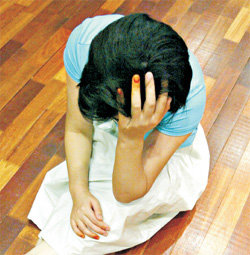Too Much Worry over Health Is a Sickness
Too Much Worry over Health Is a Sickness
Posted December. 12, 2004 23:08,

There are overloads of nutrients in drawers and herbal medicine in refrigerators. Im not trying to say that theres something wrong with being conscious of ones health and taking medicine. Yet, taking medicine is one thing and being overly frightened that its withdrawal would harm ones health is quite another. It is a sort of obsessional neurosis.
There are some cases that go further than that: over-anxiety about ones health. People with this anxiety feel nervous, believing that they have a serious disease just because of slight physical changes. Of course, no symptoms of any serious disease are found through examination. This is also a type of mental disorder illustrated in books for psychiatric medicine. These days, with the overflow of health information, we are seeing an increasing number of people who are overly concerned about their health. In a sense, our knowledge of health has resulted in a sickness among worriers. That health-consciousness accounts for 4 to 6 percent of the patients examined by internal medicine and family doctors. We should look around and wonder whether our husbands or wives are among those overly worried about their health.
▽Signs of Those Worried about Their Health
They commonly go from one hospital to another. And they do not believe in doctors diagnoses. They rather explain their symptoms in a detailed manner and disappointed that doctors do not treat them faithfully. When doctors do not spot any disease in them, they simply look down on them, saying it was an erroneous diagnosis.
They complain of particularly one or two diseases. They also are preoccupied with the outcome rather than symptoms. That is they say, It must be cerebral palsy as I have a headache, not I have a headache. Some people also go so far as to have surgery against the will of their doctor.
The problem is that their over-obsession with their health can lead to a real disease. For them, a failure to spot a disease in them can bring about depression. It can also result in difficulty in their social relationships with others, and other recurrent symptoms such as chest pain, indigestion and headache. In the worst cases, their preoccupation can lead to delusion. For example, they are deluded, thinking Cancerous cells are already all over my body, or My intestines are decaying.
▽ How to Treat
Family members constant care and persuasion are important.
At a first glance, it can look like a feigned illness. Yet, the patient is serious that he is sick. When his family, therefore, simply neglects his complaint as unsubstantiated, his symptoms or pains can worsen. Family members should persuade him to meet a psychiatrist.
Those who are overly worried about their health have a marked tendency not to admit the fact that they have a mental disorder. That is why it takes several years for them to see a psychiatrist after serial visits to surgeons and doctors in internal and family medicine and neurosis. Even if they get psychiatric therapy, they often give up in the middle of the course.
About 30 percent to 50 percent of patients who talk with a psychiatrist and take medicine continuously show an improvement in their symptoms. In many cases, anti-depressants or medicine to treat anxiety are administered in addition to medicine. In line with the therapy, internal treatment or surgery is done in the course.
There are many patients who resort to untested ways of treatment or folk remedies, obsessed that they have to get better at any cost. This, however, can lead to a deterioration of their body; so family members should watch them closely.
What about ways for prevention?
Medical experts assume that people who get too worried about their health as they reach old age can bring with it little confidence in their health and much stress. Psychoanalysis has it that unconscious desire to escape from reality can cause the disease. Therefore, having a relaxed attitude in life is the best prevention.
(Consultations from Professors Yoon Se-chang from Samsung Seoul Hospital and Yoo Han-ik from Seoul Asan Hospital.)
Sang Hoon Kim corekim@donga.com





![유학생들은 어쩌다 ‘먹튀’, 불법체류자가 되었나[이미지의 포에버 육아]](https://dimg.donga.com/c/138/175/90/1/wps/NEWS/IMAGE/2026/01/18/133179004.1.jpg)

